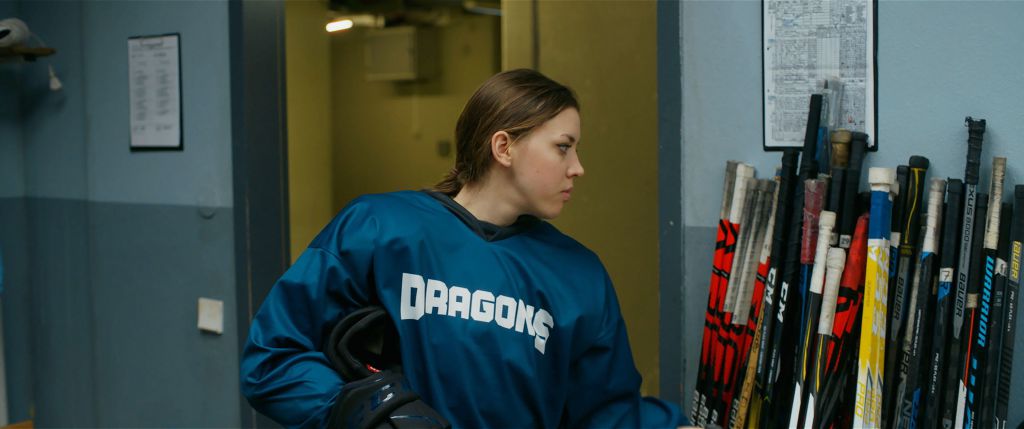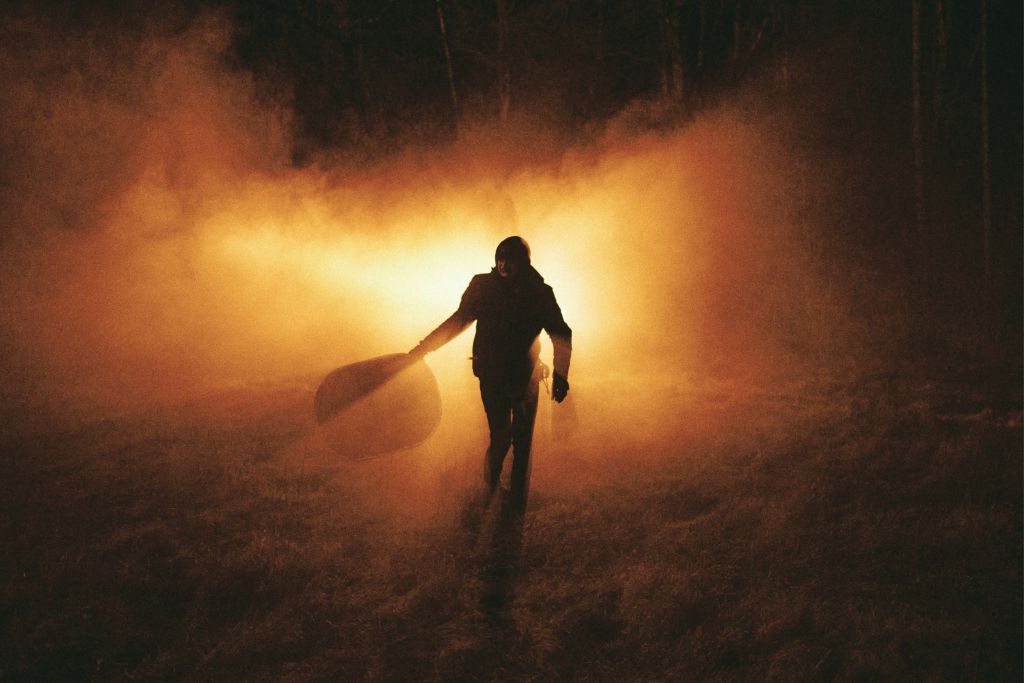Clara Stern und Peter Hengl über die Magie des allerersten Langfilms
„Was erwartet mich, wenn ich eure Filme im Kino anschaue?“, war die erste Frage des mdw-Magazins an die Filmakademie-Alumni Clara Stern und Peter Hengl. Es stellte sich schnell heraus: Bevor das Publikum sich etwas von ihren Filmen erwarten kann, müssen diese erst die Erwartungen ihrer Macher_innen erfüllen – und die sind hoch.
Die Projekte der beiden sind unterschiedlich: Clara Stern hat mit Geyrhalter Film eine erfahrene Produktionsfirma an ihrer Seite, Peter Hengl realisiert einen Film mit vier Schauspieler_innen als sogenanntes Werkstattprojekt mit vielen weiteren Langfilmdebütant_innen in seinem Team. Was sie eint: das ganz große Abenteuer des Erstlingswerks.

In Sterns Film begleiten wir die starke Hauptfigur Mira, die mitten in einem Entwicklungsprozess steckt, in ihren drei Welten: die Profi-Eishockeykarriere, das Nachtleben und das Weingut ihrer Familie. Wenn wir die Regeln brechen beschäftigt sich mit persönlicher Befreiung und mit den Normen, die uns die Gesellschaft mitgibt.
Eine starke weibliche Hauptrolle, die hat auch der Film von Peter Hengl. In Family Dinner erhofft sich die Jugendliche Simi von ihrer Tante Claudia Hilfe beim Abnehmen. Jedoch: Unerwartete, schreckliche Ereignisse lassen das Ganze schnell zu einer „seltsamen Coming-of-Age-Horrorgeschichte“ werden.

Die Tage des Drehs beschreiben die beiden Langfilm-Neulinge als gleichermaßen anstrengend wie großartig. Lange Drehtage, viele neue Eindrücke und alle Augenblicke eine Entscheidung, die das Ergebnis maßgeblich beeinflussen wird. „Bei vielen Dingen hatte ich vorher noch nie darüber nachgedacht, dass ich das einmal entscheiden werde müssen. Was meine Arbeit ist als Regie, ist mir erst jetzt vollständig bewusst geworden“, erzählt Stern.
Viele dieser Entscheidungen mögen wie unwichtige Details wirken. Sie sind aber doch wesentlich, um das Mosaikbild, das so ein Film am Ende ist, stimmig aussehen zu lassen. Ist das perfektionistisch? Ja, aber genau darum geht es: „Das Schöne am Film ist, dass alles alles beeinflusst“, sagt Stern. Und auch Hengl sieht in der Regie eine „unglaubliche Detailarbeit, wo man auf jeden Brösel achtet“.
Gleichzeitig berichten beide von einer anderen wichtigen Eigenschaft, die man als Regisseur_in haben muss: Die Essenz der Szene festzuhalten, aber flexibel genug zu bleiben, um die ganz eigene Dynamik des Drehs berücksichtigen zu können. „Regie führen bedeutet für mich, zu wissen, was der Kern der Geschichte ist, und dies auch den anderen klarzumachen“, so Hengl. Am Set, gemeinsam mit allen, die an dem Film arbeiten, können dann fast Wunder geschehen: „Da entstehen dann plötzlich geniale Spontaneitäten, die besser sind als alles, was man sich jemals hätte ausdenken können.“
Auch Clara Stern hat das bei ihrem Dreh erlebt. Ihr Motto: „Man muss einen Plan haben, und der Plan ist dazu da, dass man ihn hinterfragen darf.“ Die vielen Fachleute, die sie um sich hatte, empfand sie dabei als große Bereicherung.
Als eklatantesten Unterschied zu ihren bisherigen, kürzeren Arbeiten bezeichnen Hengl und Stern die schiere Größe der Unternehmung und den damit steigenden Koordinationsaufwand. „Ich habe das Gefühl gehabt, es ist wie in einem Ameisenhaufen manchmal“, so Stern. Was aber auch Vorteile hatte: Mit den vielen Expert_innen am Set und nicht zuletzt dank der tollen Arbeit ihrer Regieassistentin konnte sie sich auf die Kernaufgaben einer Regisseurin konzentrieren.

Bei Peter Hengls kleinerer Produktion kam zu seinen Regie-Aufgaben noch viel Organisatorisches hinzu. Und dieser besondere, ganz eigene Druck, der Erstlingsfilmen innewohnt: „Es geht um viel mehr als bei einem Kurzfilm.“ Der erste Langfilm, das sei die Visitenkarte, mit der man sich in der Branche vorstelle. Der entscheide, ob man überhaupt die Chance bekommt, einen zweiten Film zu machen. Ähnlich formuliert es auch Clara Stern: „Diesen Film kann ich nicht in der Schublade verschwinden lassen, selbst wenn ich das Gefühl hätte, ich bin gescheitert.“
Das Scheitern, das Verschwinden von Übungsfilmen in der Schublade, das war an der Filmakademie Wien noch möglich. Für Stern ein großer Luxus – wie auch die guten Kontakte in die Filmbranche, die sie schon während ihrer Ausbildung knüpfen konnte. Auch Hengl sieht das so: „Die Kurz- und Übungsfilme, das ist wie Üben im Kinderbecken. Mit dem Langfilm steht man plötzlich am Sprungbrett der Olympischen Spiele in Tokio und alle fragen: Was ist jetzt?“

Dass das alles mehr als ein Beruf ist, formuliert Hengl, der sein Projekt als die Erfüllung eines Lebenstraums bezeichnet, so: „Es ist mir jeden Tag bewusst, dass das ein unglaubliches Privileg ist. Ich wache jeden Tag glücklich singend wie eine Disney-Prinzessin auf, weil ich die Ehre und Freude habe, das machen zu dürfen.“
Das Endergebnis wird sich in beiden Fällen sehen lassen können. Stern und Hengl sind zufrieden damit, wie es bisher läuft. Derzeit befinden sich die Filme noch in der Postproduktion, die Kinostarts von Wenn wir die Regeln brechen und Family Dinner sind für das Jahr 2022 geplant.

